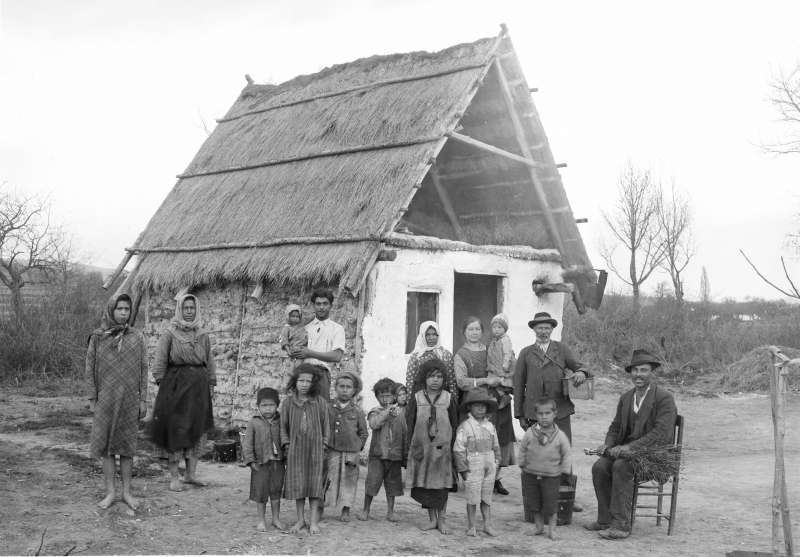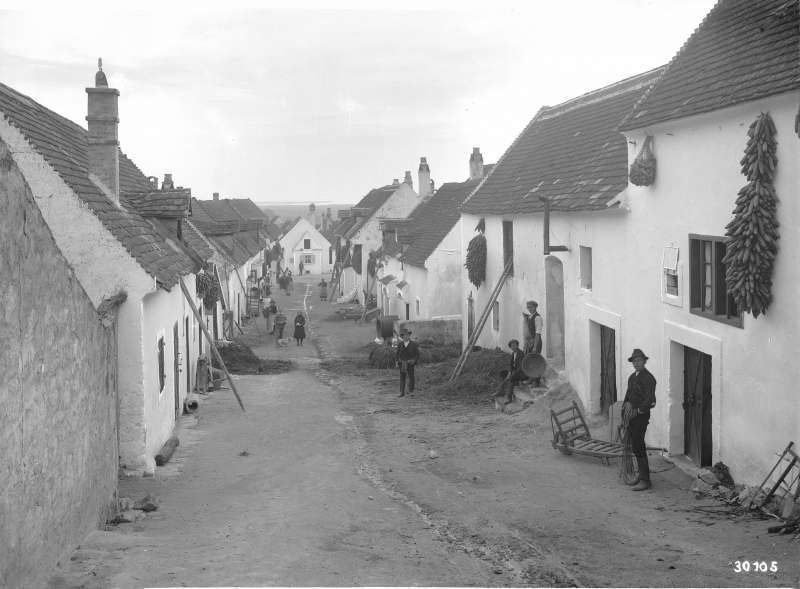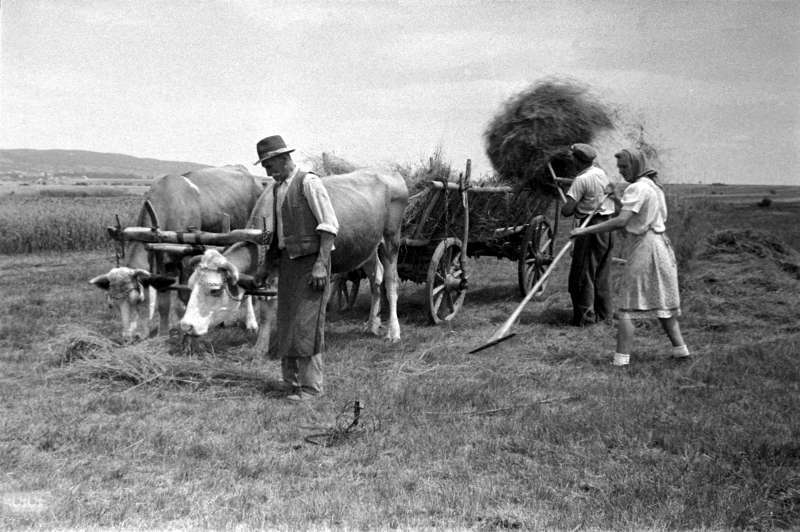Andreas H.
Born in the Lackenbach camp
I was born on 1st February 1942 in a wooden barrack in the forced labor and deportation camp in Lackenbach, Mittelburgenland.
I would like to mention, if I may, that in the mid-1930s, around 11.000–15.000 Roma and Sinti were statistically recorded in Austria, thousands of which, on racial grounds and in the name of the "final solution", were deported or exterminated, died of hunger, thirst or illness or due to the hard labor in quarries, suffocated in the wagons before arriving at their destination or were forced to disembark in their hundreds, taken into the woods and shot there by special SS units. [1]
I know from my mother and my older siblings that the Lackenbach camp was equipped the same as all of the other concentration camps in Germany, Austria and Poland, except there were no ovens or crematoria installed for gassing people. [2] Therefore, every day at 6 am roll call, men, women and children were selected and loaded onto the transports to the large concentration camps and deported. During this daily "ceremony" the SS units were, of course, also present with their killer dogs. One day, my older brother and his friend had stolen two cobs of corn on their way home from their forced labor because they were so hungry. But they were caught and brought into the camp by the SS where they received 50 lashes on their backs, behinds and legs with an oxtail whip. After this beating, they were unable to work for 14 days and only received cabbage soup and a piece of bread to eat each day. They were only fourteen at the time, and only their strong will to survive kept them alive. Or if someone arrived at roll call too late in the morning, he would receive 25 blows with a stick and nothing to eat for three days, followed by work as an extra punishment, such as cleaning the toilets etc. If someone no longer had the strength to keep going and collapsed due to malnutrition, for example while working on road construction, he was shot on the spot. And I could go on with the list of atrocities which were carried out in the Lackenbach camp between 1941 and 1945 until the camp was liberated by the Russians. I would also like to mention the unhygienic conditions in the wooden barracks, where, above all in winter, the fleas, lice and bedbugs would crawl into the wooden planks and suck the blood from the prisoners during the night, infecting them. Infection with epidemic typhus was a daily occurrence and many people died of it. An equally frequent cause of death was murine typhus and dysentery, illnesses which many inmates caught because of the poor and insufficient nutrition.
From the house in Mörbisch to the camp
I would also like to mention that the old house in Mörbisch, which was owned by the third generation on my father's side, my grandparents Antonia and Andreas, was expropriated. A family from the area acquired the house at a ridiculously low price. Neither my grandparents nor the twelve children received anything and in August 1938 a clay and reed hut was leased to them.
At the same time, a certain Dr. Portschy [3], an architect, was in Rechnitz and already commissioner and head of the deportation and extermination plan for the Roma and Sinti in Burgenland, where most were resident, practiced their professions or worked as day-laborers for the farmers. It was also Dr. Portschy who issued a decree in 1938 prohibiting children of Roma, Sinti and Jews from attending school. This decree was published in the provincial official gazette in fall 1938. Some schools complied with it and others directed inquiries to the ministry in Vienna. After the Viennese ministry, on behalf of the Reich ministry in Berlin, had failed to release a decision by June 1939, the individual provincial school boards were instructed to provide information on the types of settlement and on the numbers of school-age children in the mentioned groups, in order to be able to reach a uniform solution to the matter of Jewish, Roma and Sinti school attendance. However, the question became redundant as half a year later the Lackenbach camp, designed by Dr. Portschy, was completed and the Roma and Sinti were deported there. According to my parents and relatives, they were taken from their houses and caravans and hauled off to an inhumane, miserable existence.
I can remember neither my illness nor anything else in the concentration camp Lackenbach, but I know from my parents and siblings that I was very sick, once with typhoid and twice with dysentery. I also know from my siblings who are still alive that I was so hungry that I ate that which had passed out of my behind. The time spent in the camp during my earliest childhood gave me chronic articular and muscular rheumatism as well as chronic bronchial asthma
The end of the war and afterwards
In the Holy Week of 1945, the Lackenbach camp was torched to obliterate all traces of a concentration and forced labor camp. Where they had enough time, internal data on the inmates was destroyed or burned. On the day before our "departure", Mr. Brandtner [4], the camp commandant, secretly told my mother to inform all the inmates who were still there to pack their belongings and, as soon as night began to fall, to leave the camp as quickly as possible as it was going to be torched and blown up. In the afternoon, and I can still remember this – I think it was my first perception as a toddler of 2 ½ years – everyone had to attend roll call. I remember it well because it was a beautiful, warm day and the musicians, who hadn't yet been deported, had to perform in front of the entire camp management and all of the prisoners. It had also been known in the camp for a few days that the Allies were approaching – in this territory it was the Soviets. And so, as darkness fell, all of the remaining Roma and Sinti, mostly families, made their way back home, my family too. They went via Schattendorf, at times through the Hungarian forest, Weppersdorf etc. and, from Mittelburgenland, reached Mörbisch in Northern Burgenland.
As my grandparents and my parents had been very popular in Mörbisch and were regarded with particular affection by a Catholic family, especially my grandmother Antonia, who was deeply religious, we were welcomed warmly and amid many tears by this family. During the time we had been in the concentration camp they had worked on and taken care of our land. It was also this family who took in our family with eight children during the difficult times after the war, fed us at their table and stood by us in often difficult situations. (They had themselves lost two sons in the war). We sometimes slept on hay in barns and my parents and siblings, who were for the most part already adults, worked both on this family's farm and on our own.
Later, we were given a small thatched house in Seestraße on the lake by the municipality of Mörbisch. We had to dig out the bricks from the former anti-aircraft-gun range ourselves and transport them in wheelbarrows for the building shell. Over the next ten to fifteen years, my family was able to achieve remarkable social affluence, so much so that we younger children could attend school and I, Andreas, was even able to go to the Academic High School-Seminary Katzelsdorf/Leitha.
I survived the Holocaust as a very small child, was born in the middle of it in fact, and as an adult still bear the physical and mental scars from my suffering. And so, regardless of what nation or group of the population you belong to, when reading these lines which tell of the suffering inflicted on people during the Holocaust I request you not to simply turn the page but to stop and think and, as far as it is possible, help to prevent such suffering personally.
This article was first published in: Nationalfonds der Republik Österreich für Opfer des Nationalsozialimus (ed.): In die Tiefe geblickt. Lebensgeschichten. Edition INW Vienna 2000.
[1] Of at least 11.000 Austrian Roma and Sinti, around 9.500 were murdered under Nazi rule.
[2] By the end of 1941, there were over 2.300 inmates in the "gypsy camp" Lackenbach, set up in late 1940. By the end of the war, at least 250 inmates were to have died in the camp itself, 2,000 were deported and for the most part murdered in the extermination camp Chelmno. Only 300 – 400 people survived to see the liberation.
[3] Dr. Tobias Portschy, initially the head of the regional administration (Landeshauptmann) in Burgenland from March 1938 and from October 1938 deputy head of the regional administration (stellvertretender Gauleiter) in Styria. In 1938, he wrote the inflammatory book "Die Zigeunerfrage" ("The Gypsy Question") which anticipated the extermination of the Roma and Sinti. In 1949, he was sentenced to 15 years in prison; however, he was pardoned as early as 1951.
[4] The name of the last camp commandant in Lackenbach was Julius Brunner.




